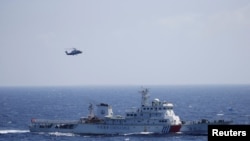This week Chinese state media reported that Beijing is hoping to finalize next year a long-stalled code of conduct for the South China Sea, which could lessen territorial tensions among countries in the region. The official China Daily reported that diplomats representing China and member nations of the Association of Southeast Asian Nations (ASEAN) approved a new hotline for maritime emergencies and vowed to complete a draft of the code of conduct by the middle of next year.
Completing the legally-binding code of conduct would mark a major breakthrough after more than a decade of largely fruitless negotiations. Outside observers are skeptical about the chances for a deal, in part because of China's more aggressive posture in the region following the ruling by the U.N.-backed arbitral tribunal that largely dismissed many of Beijing's maritime claims.
Chinese officials have sent aircraft on "combat patrols" near contested islands in the South China Sea, and satellite images reviewed by the Center for Strategic and International Studies show new aircraft hangars capable of housing their fighters.
Beijing Defiant After UN Ruling
"I think what [China is] trying to achieve is basically is just to share their anger with the recent ruling that was in the Court of arbitration in The Hague," said Harry Kazianis, Senior Fellow for Defense Policy at the Center for the National Interest, on VOA’s Asia Weekly podcast.
“I think we have to break this down into two sets of reactions,” Kaszianis noted. “The first set of reactions is basically what’s happened from July and basically what’s going to happen until early September,” because that’s when China is going to host the G20 Summit. Kazianis also says Beijing will continue pushing ahead with current tactics.
Greg Poling, Director of the Asia Maritime Transparency Initiative at the Center for Strategic and International Studies, says it has been China’s long term strategy to exert de facto control over the area. Given the competing claims in the region by other ASEAN members and the recent ruling from The Hague, did the international community wait too long to push back on Beijing’s claims by carrying out freedom of navigation exercises, which are sometimes called FoN ops?
“You can argue with certain tactical decisions. Did the US wait too long to [conduct] FoN Ops? Maybe. Should they have reacted more strongly to the Scarborough Shoal seizure in 2012? Maybe. But I think the long term strategy has been sound.”
Poling identified 2014 as the year that China changed the way it was putting forward its claims. He says it was widely known that Beijing was bullying and coercing its neighbors like Vietnam and the Philippines, but "in 2014, all of a sudden, we had Chinese artificial islands cropping up where previously there had only been submerged rocks reefs, and that changed the balance of power in a really fundamental way."
U.S. ships and planes have refused to recognize Beijing's maritime territorial claims, conducting freedom of navigation patrols near the islands that largely ignore warnings from local Chinese commanders to vacate the area. Chinese authorities insist that foreign vessels are violating Beijing's territorial waters. U.S. vessels reply that they are in international waters. These exchanges are what has led the U.S. Defense Department to say that China is asserting "excessive maritime claims" that try to restrict the freedom of movement of foreign vessels.
Submerged Reefs Become Chinese Airstrips
China's construction efforts mean that military or law enforcement assets can be deployed in the remote region in numbers never seen before. Poling said that if the goal is to establish effective control in peacetime, "It's just hard to see how the Vietnamese and Filipinos and the Malaysians can continue to operate in a real way. . . without China’s forbearance."
The situation remains precarious, as countries in the region and the United States wait to see how China will handle the dispute at a time when Beijing is exercising its bigger political influence as a rising economic power. Kazianis says rising powers have always challenged the established status quo. "So what happens next is really a history problem above all else and how the United States and its allies will react to that. What carrots and sticks still provided Beijing to either be a responsible international partner are not ... what things they're willing to put at risk in order to sort of put some barriers, some roadblocks in front of Beijing to do that. That's really the next key it in this whole struggle for probably the next decade or so."
A key question is whether China will continue to assert territorial claims that regional countries and the United Nations dispute. Poling says if Beijing makes the issue a core priority, the United States and its allies must determine the cost of challenging that position.
"If China is absolutely committed to this strategy — no matter the diplomatic cost — then it's hard to see what the international community or those most involved, like the U.S. and Japan, can do. We can try to deter outright Chinese aggression, but ultimately the long-term game is to try and name and shame Beijing, hoping that eventually Beijing realizes this isn't the way great powers behave, and [that] it's undermining its own long term interest."
While that provides little hope for resolving the situation in the short term, Poling said, "if you recognize that ultimately this is a five or 10 year contest of wills, then it’s the only tool you have."





